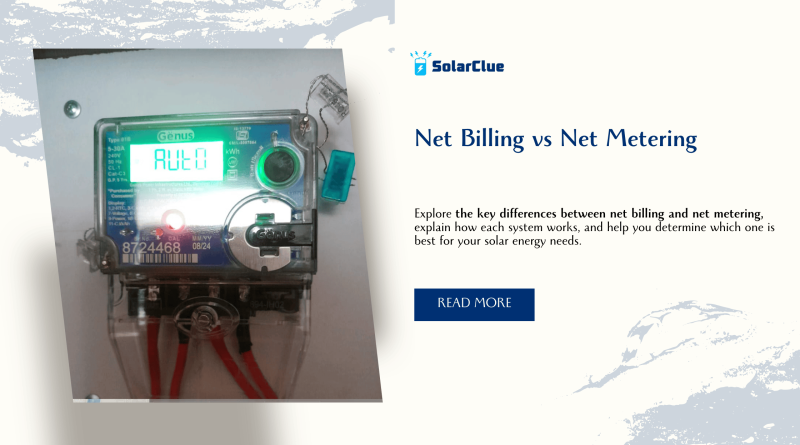Net Billing vs Net Metering
As solar energy becomes more popular and affordable, homeowners and businesses are looking for ways to maximize their savings while contributing to a cleaner environment. Two common mechanisms that allow solar users to benefit from generating their own electricity are net metering and net billing. While both systems offer ways to manage and potentially profit from solar energy, they operate differently and have varying impacts on how much you can save or earn from your solar investment.
In this blog, we’ll break down the key differences between net billing and net metering, explain how each system works, and help you determine which one is best for your solar energy needs.
Table of Contents
- 1 What is Net Metering?
- 1.1 How Net Metering Works:
- 1.2 What is Net Billing?
- 1.3 How Net Billing Works:
- 1.4 Key Differences Between Net Metering and Net Billing
- 1.5 Pros and Cons of Net Metering
- 1.6 Pros and Cons of Net Billing
- 1.7 Which One is Better: Net Metering or Net Billing?
- 1.8 Key Considerations Before Choosing Between Net Metering and Net Billing
- 1.9 Conclusion
- 1.10 FAQs
What is Net Metering?
Net Metering is a billing mechanism where solar energy system owners can send excess electricity generated by their solar panels back to the grid and receive credits for it. The key feature of net metering is that these credits are valued at the retail rate of electricity—the same rate at which you buy power from the grid.
How Net Metering Works:
1. Energy Generation: Your solar panels produce electricity to power your home or business.
2. Surplus Energy: If your solar panels generate more energy than you need at a given time (e.g., during the day), the excess is exported to the grid.
3. Energy Credits: You earn credits for the energy you export at the retail rate, which can be used to offset the electricity you consume from the grid later (e.g., at night).
4. Billing: At the end of the billing cycle, your utility calculates the net difference between the energy you consumed from the grid and the energy you exported. If you’ve exported more than you consumed, you receive a credit. If you consumed more, you pay for the net usage.
Example:
If your solar system generates 500 kWh in a month and you consume 400 kWh, the extra 100 kWh is sent to the grid. With net metering, you will be credited at the retail electricity rate for the 100 kWh exported, reducing your future electricity bills.
What is Net Billing?
Net Billing is a similar system to net metering, but with one key difference: the energy you export to the grid is compensated at a lower rate than what you pay for the energy you consume from the grid. The utility purchases the excess solar electricity at a pre-determined rate, usually lower than the retail rate.
How Net Billing Works:
1. Energy Generation: Your solar panels generate electricity for your home or business.
2. Surplus Energy: When your solar panels produce more electricity than you need, the excess is exported to the grid.
3. Compensation: You are compensated for the energy you export at a lower rate, usually a wholesale rate, which is often lower than the retail rate.
4. Billing: You pay for the energy you consume from the grid at the retail rate, but the credit for the exported energy is applied at the lower compensation rate.
Example:
If your solar system generates 500 kWh and you consume 400 kWh, the remaining 100 kWh is exported to the grid. With net billing, you are paid for the 100 kWh at a rate lower than the retail electricity rate. This means the compensation you receive for exporting energy will not directly offset your retail electricity costs as it does with net metering.
Key Differences Between Net Metering and Net Billing
To understand the distinctions between net metering and net billing, let’s break down the differences across several important factors:
| Feature | Net Metering | Net Billing |
|---|---|---|
| Compensation for Surplus | At retail electricity rate | At a lower (wholesale or feed-in) rate |
| Energy Credit Value | Equal to the cost of electricity consumed | Lower than the cost of electricity consumed |
| Net Calculation | Based on the difference between energy imported and exported | Exported energy is compensated separately |
| Bill Offset | Full offset possible, including future bills | Partial offset due to lower export rate |
| Best For | Homeowners and small businesses with moderate energy needs | Large-scale commercial setups with high energy export |
| Complexity of Billing | Simple, direct bill credits | More complex, with two different rates |
| Earnings Potential | Higher, as credits are at retail rates | Lower, as surplus energy is valued at a lower rate |
Pros and Cons of Net Metering
Pros:
1. Higher Savings Potential: Since surplus energy is credited at retail rates, it directly offsets your electricity bill, potentially leading to significant savings.
2. Simple and Transparent: Net metering operates on a straightforward principle of balancing energy consumed and exported.
3. Encourages Solar Adoption: With higher savings, net metering is attractive for homeowners and businesses looking to reduce energy costs and earn credits for excess solar generation.
Cons:
1. Regulatory Changes: Some regions are capping or phasing out net metering due to the strain on the grid from large-scale solar adoption.
2. Limits for Larger Systems: In some areas, net metering may only be available for smaller systems, limiting its use for large commercial installations.
Pros and Cons of Net Billing
Pros:
1. Predictable Payments: With net billing, you know exactly how much you’ll be compensated for any excess energy, which is beneficial for large commercial systems producing a lot of surplus power.
2. Better for Large Systems: Net billing can be more practical for large solar systems where continuous power generation exceeds the consumption needs.
Cons:
1. Lower Compensation: Since surplus energy is compensated at a lower rate than what you pay for electricity, the financial returns are smaller.
2. Complex Billing: Net billing involves separate accounting for energy exported and consumed, which can make your electricity bills more complicated.
Which One is Better: Net Metering or Net Billing?
The choice between net metering and net billing depends largely on your energy consumption patterns, solar system size, and financial goals.
Net Metering is Ideal For:
- Homeowners and Small Businesses: If you have a moderate solar energy system that covers most or all of your energy needs, net metering provides the best financial return by directly offsetting your electricity bill.
- Maximizing Bill Savings: Since you receive retail credits, you can often reduce or even eliminate your electricity bills.
Net Billing is Ideal For:
- Large-Scale Solar Installations: For commercial or industrial setups where energy generation often exceeds consumption, net billing provides a predictable way to earn compensation for exporting large amounts of energy.
- Low Energy Consumption but High Solar Generation: If your energy consumption is low but you generate a large amount of solar energy, net billing can still provide a steady income, even if the compensation rate is lower.
Key Considerations Before Choosing Between Net Metering and Net Billing
1. Local Regulations: Your choice may be limited by your state or utility provider’s policies. Some regions are moving away from net metering and offering net billing instead.
2. Solar System Size: If your system is sized to meet your own energy needs, net metering can provide more immediate savings. If you have a large system producing more energy than you can use, net billing may make more sense.
3. Energy Consumption Habits: If you consume most of your energy during the day when solar panels generate power, net metering offers better savings. If your consumption is low but generation is high, net billing might suit you.
4. Future Energy Needs: If your energy needs are expected to increase in the future, net metering may be more beneficial, as you can accumulate energy credits for future use.
Conclusion
Both net metering and net billing offer solar users ways to benefit from the energy they produce, but they work in different ways. Net metering generally provides more immediate and higher savings by crediting excess energy at retail rates, making it ideal for residential and small business users who want to lower their energy bills. On the other hand, net billing is suited for large-scale solar generators, where a consistent compensation for exported energy provides steady returns, even if at a lower rate.
Understanding the differences between these two mechanisms can help you make the most of your solar energy investment. Always check with your utility provider and local regulations to see which system is available in your area and which aligns with your energy goals.
Ready to Save on Electricity Bills with Solar Power?
With Net Metering, you can drastically reduce your electricity costs by generating your own solar power and sending any excess back to the grid. It’s time to harness the sun’s energy and make a positive impact on both your wallet and the environment!
At SolarClue, we make the transition to solar simple, efficient, and affordable. Whether you’re a homeowner, business, or institution, our team of solar experts will guide you through the process—from installation to maintenance—so you can start saving from day one.
🌞 Take the first step towards energy independence today!
🔋 Get your solar consultation now!
Contact SolarClue or call us at +91-888-4444-830 to explore the best solar solutions for your home or business.
Go Solar. Save More. Power Your Future with SolarClue!
FAQs
1. Can I switch between net metering and net billing?
It depends on your utility provider and local regulations. Some utilities allow switching, but it may require new metering equipment.
2. Is net billing available in all states?
Net billing is becoming more common, especially as net metering is phased out in some areas. Check with your state or utility for availability.
3. Which system offers higher savings?
Net metering generally offers higher savings because excess energy is credited at the retail rate, whereas net billing credits are typically lower.
4. Is net metering being phased out?
In some regions, yes. Many utilities are moving towards net billing or other alternatives due to the growing number of solar installations.
5. Can I earn money with net billing?
Yes, but the income from net billing is generally lower than the savings from net metering, as the compensation rate is typically lower than the cost of electricity.




